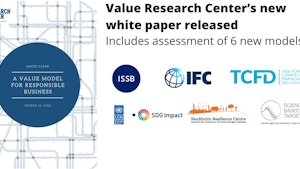Asia Pacific‘s leading platform for sustainable development
#business resilience News

Policy & Finance
14 sustainable innovations that gave us hope in 2025
From carbon-lite AI to recycled human hair, Eco-Business sifts through the technologies that tackled environmental and social problems in a year that artificial intelligence use exploded and climate impacts intensified.

Over 70 per cent of organisations are investing more than 10 per cent of their capital expenditure in low-carbon initiatives as digitalisation and automation take centre stage.

Policy & Finance
Transition finance in turbulent times: OCBC on decarbonising Asia’s toughest sectors
EB Studio
Global sustainability setbacks will not affect the Singapore lender’s transition engagement efforts with businesses, especially those committed to their net zero efforts, says Yoonmee Jeong, who heads OCBC's global wholesale banking sustainability office.

Carbon & Climate
UN calls for transition metals mining finance reform to protect environment and human rights
A UN report warns that financing for critical minerals must align with environmental and social goals if the energy transition is to avoid repeating the harms of the fossil fuel era. Most mining firms believe that robust ESG reporting is costly, but could help attract new investors.
Corporate Responsibility
The Conference Board closes Singapore-based Asia sustainability council
#business resilience Opinion

Corporate Responsibility
Has sustainability become unsustainable?
For companies, the challenge is not choosing between idealism and abandonment but forging a pragmatic path that balances resilience, local adaptation, and long-term business priorities.

Last December's launch of Malaysia's first national EV could spur local component production, but this could be constrained by market conditions while the country's old supply chain, in which the carmaker remains heavily invested, will endure.

Policy & Finance
The Fed is running scared of Trump
The Federal Reserve is perhaps the most significant independent economic actor in the US. Yet it has surrendered to Trump – the Fed Board withdrew from a global network that brought together central banks to improve climate risk management.

Policy & Finance
Need human rights research? Talk to the Global South
If a tea seller or a street vendor in Mumbai had drafted the United Nations Guiding Principles on Business and Human Rights, they might have looked very different. The focus on Global North research in academia needs to shift.
Carbon & Climate
Could the low-carbon economy bill re-write the Philippines' future?
Carbon & Climate
Mapping the future of ESG at COP28
#business resilience Videos

Policy & Finance
Simplifying sustainability reporting for SMEs
EB Studio
As Malaysia forges ahead with its 2050 net zero climate ambition, businesses must reshape their supply chains for a low carbon future. This Eco-Business video looks at how SMEs can adapt to new sustainability reporting requirements.

Carbon & Climate
Climate tech in Asia – finding the ‘X’ factor for success
Funding for climate-related solutions has slowed down and it’s a ‘tough game’ for startups, said those familiar with the climate tech space at The Liveability Challenge Grand Finale 2025. What can founders and innovators do to bring an idea to commercialisation? And is Singapore an attractive-enough testbed?

EB Studio
From sponge cities to coastal forests, Asia is seeking ways to work with nature and prepare for the risks in a warmer-than-expected future. This Eco-Business video looks at what else cities need to do to strengthen climate resilience.

Corporate Responsibility
Explainer: How does corporate purpose drive sustainable growth?
EB Studio
Amid fresh debates about what corporate purpose should be, there is mounting evidence that corporate purpose leads to stronger brand reputation, better talent attraction and more resilience, leading to improved financial performance.
#business resilience Podcasts

Green Buildings
Inaction is not an option for companies in climate-vulnerable nations like India: Lodha ESG chief Aun Abdullah
In the latest episode of 'On the frontlines', the real estate giant's ESG head tells the EB Podcast that while there has been no pushback on climate action by corporate India, questions remain over whether the booming real estate sector is decarbonising fast enough.

Corporate Responsibility
To fight ESG scepticism, build alliances: Singtel’s Andrew Buay on the survival secrets of a chief sustainability officer
Andrew Buay, vice president for group corporate sustainability at Singtel, tells the EB Podcast that CSOs should not be precious about losing part of their job as the function evolves.

Trump 2.0 may prove to be a "bump in the road" for climate action, but banks and investors in Asia see growth and opportunity in the region for decarbonisation as climate risks grow.
#business resilience Press Releases

United Nations Economic and Social Commission for Asia and the Pacific (ESCAP)
SMEs go green: United Nations ESCAP, Temasek Foundation launch programme linking sustainability with market opportunities

Global Compact Network Singapore
Regional corporate sustainability summit underlines the need for SEA businesses to take decisive action

Singapore FinTech Festival
Singapore FinTech Festival 2022 returns as an in-person event

Energy Development Corporation
First-Gen EDC enables more PH companies to shift to green energy

Value Research Center (VRC)
Value Research Center (VRC) launches integrated Value Model
#business resilience Research

Wunderman Thompson
Wunderman Thompson launches regeneration rising: Sustainable futures

Accenture and WWF-Singapore
Sustainability in Singapore—consumer and business opportunities

Conservation International, DBS Bank, National University of Singapore (NUS) and Temasek
The business case for natural climate solutions: Insights and opportunities for Southeast Asia

WWF-Singapore
The business case for a UN treaty on plastic pollution




